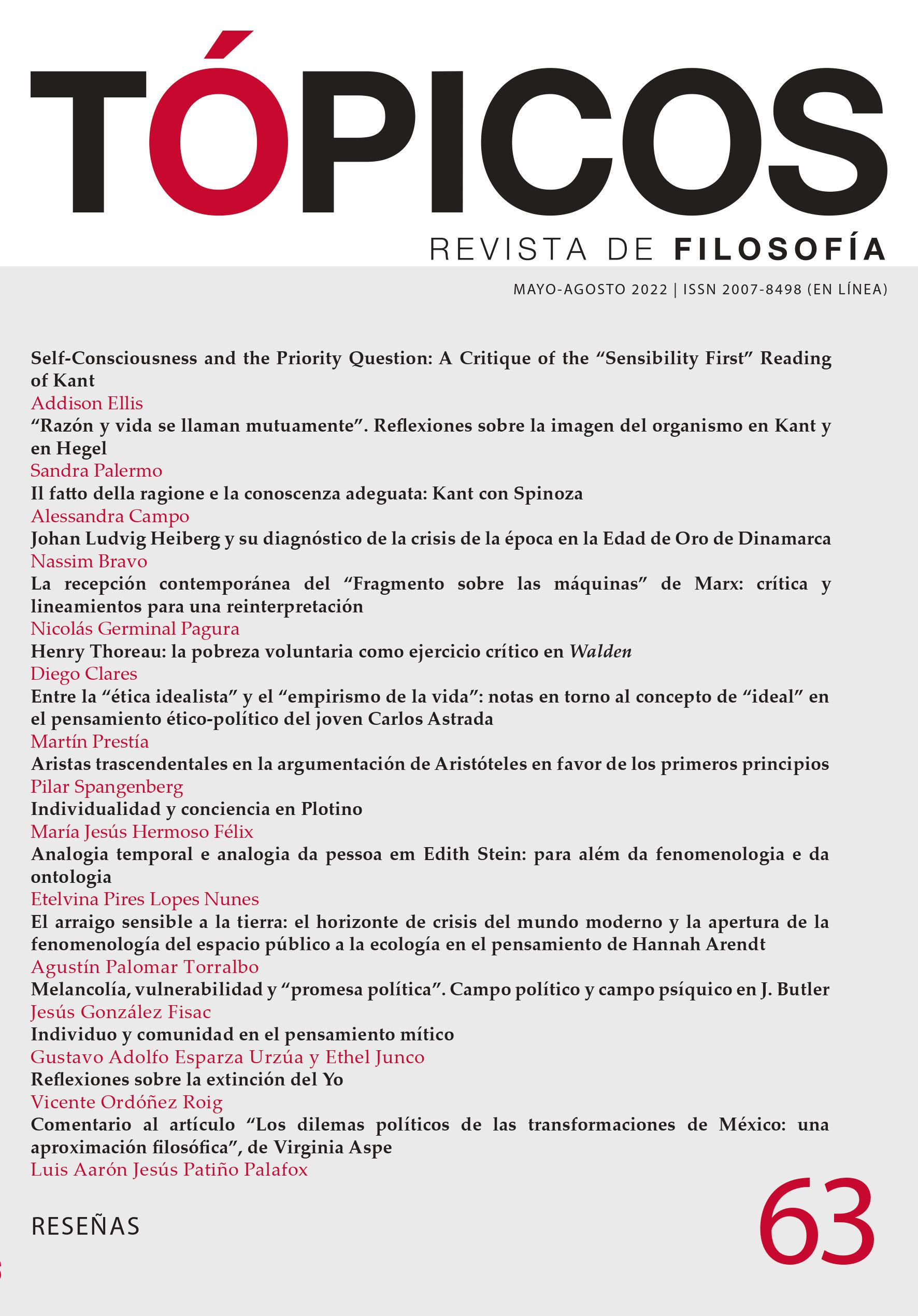Pubblicato 2022-04-18
Parole chiave
- conciencia,
- individualidad,
- Plotino,
- neoplatonismo
Copyright (c) 2022 Tópicos, Revista de Filosofía

Questo volume è pubblicato con la licenza Creative Commons Attribuzione - Non commerciale - Non opere derivate 4.0 Internazionale.
Come citare
Abstract
La cuestión de la individualidad en Plotino es una de las más debatidas. A lo largo de las Enéadas, la problemática del sujeto individual se ve atravesada por la complejidad en la comprensión del hombre y del alma. Al hombre inteligible, al hombre interior o primer hombre, viene a añadírsele un segundo hombre, de modo que “hemos llegado a ser el conjunto de ambos hombres” (En. VI 4 (22) 14.28-30). Esta cuestión ha sido extensamente tratada desde diferentes ángulos que desembocan bien en una solución puramente estructuralista, o bien, en su crítica y la búsqueda de una definición más estable de la identidad subjetiva. La tesis que defenderemos en este artículo, y que nos posicionará en el debate, trata de dar una nueva perspectiva de la cuestión arraigándola principalmente en el ámbito de la vida y sus formas. La continuidad entre los diferentes hombres vendrá determinada por la continuidad entre los diversos modos de la vida, cuestión primaria a la que se subordina la problemática de la individualidad y los diferentes modos de la conciencia.
Riferimenti bibliografici
- Bibliografía
- Fuentes
- Aristóteles. (1831-1870). Opera. I-V. E. Bekker (ed.). Academia Regia Borussica.
- Aristóteles. (1924). Methaphysics. D. W. Ross (trad.). Clarendon Press.
- Aristóteles. (1961). De Anima. D. W. Ross (trad.). Cambridge University Press.
- Aristóteles. (1968). De Animal. Books II and III. D. W. Hamlyn (trad.). Clarendon Press.
- Aristóteles. (1988). Acerca del alma. T. Calvo (trad.). Gredos.
- Aristóteles. (1994). Metafísica. T. Calvo (trad.). Gredos.
- Platón. (1961). Opera. I-V. J. Burnet (ed.). Clarendon Press.
- Platón. (1992a). Sofista. En Diálogos. V. (pp. 331-482). N. L. Cordero (trad.). Gredos.
- Platón. (1992b). Timeo. En Diálogos. VI. (pp. 155-261). F. Lisi (trad.). Gredos.
- Plotino. (1924). Ennéades. Siete volúmenes. E. Bréhier (ed. y trad.). Les Belles Lettres.
- Plotino. (1951-1973). Opera. [Editio maior]. Tres volúmenes. Henry P. y H. R. Schwyzer (eds.). Desclée de Brower-E. J. Brill.
- Plotino. (1964-1982). Opera. [Editio minor]. Tres volúmenes. Henry P. y H. R. Schwyzer (eds.). Clarendon Press.
- Plotino. (1982-1998). Enéadas. I-VI. Tres volúmenes. J. Igal (ed. y trad.). Gredos.
- Plotino. (1984). Ennead V. A. H. Armstrong (ed. y trad.). Loeb Classical Library.
- Plotino. (2004). Traité 53 (I, 1). G. Aubry (ed. y trad.). Cerf.
- Plotino. (2018). The Enneads. L. P. Gerson (ed.). L. P. Gerson, G. Boys-Stones, J. M. Dillon, R. A. H. King, A. Smith y J. Wilberding (trads.). Cambridge University Press.
- Estudios
- Armstrong, A. M. (1977). Form, Individual and Person in Plotinus. Dionysius, 1, 49-68.
- Blumenthal, H. J. (1966). Did Plotinus Believe in Ideas of Individuals? Phronesis, 11(1), 61-80.
- Blumenthal, H. J. (1971). Plotinus’ Psychology. Martinus Nijhoff.
- Aubry, G. (2008). Individuation, particularization et determination selon Plotin. Phronesis, 53, 271-289.
- Bréhier, E. (1928). La philosophie de Plotin. Vrin.
- Chiaradonna, R. (2014). Plotinus on Sensible Particulars and Individual Essences. En A. Torrance y J. Zachhuber (eds.), Individuality in Late Antiquity (pp. 46-61). Ashgate.
- Emilsson, E. K. (1988). Plotinus on Sense-Perception. Cambridge University Press.
- Fronterotta, F. (2011). De quoi il n’y a certainement pas de forms? Une question platonicienne et ses réponses chez Alcinoos et Plotin. Études platoniciennes, 8, 43-52.
- García Bazán, F. (1981). Plotino y la gnosis. Fundación para la Educación, la Ciencia y la Cultura.
- Girard, C. (2013). L’identité ontologique du nous (ἠμεῑς) chez Plotin. Études platoniciennes, 10, 1-27.
- Goldschmidt, V. (1953). Le système stoïcien et l’idée de temps. Vrin.
- Hadot, P. (1960). Être, vie, pensée chez Plotin et avant Plotin. En E. R. Dodds, W. Theiler, P. Hadot, H.-C. Puech, H., Dörrie, V. Cilento, R. Harder, H. R. Schwyzer, A. H. Armstrong y P. Henry, Les sources de Plotin. (pp. 107-157). Fondation Hardt.
- Hadot, P. (1980). Niveaux de conscience dans la mystique de Plotin. Journal de Psychologie, 2-3, 243-266.
- Hadot, P. (1997). Plotin ou la simplicité du regard. Gallimard.
- Henry, P. (1960). Une comparaison chez Aristote, Alexandre et Plotin. En E. R. Dodds, W. Theiler, P. Hadot, H.-C. Puech, H., Dörrie, V. Cilento, R. Harder, H. R. Schwyzer, A. H. Armstrong y P. Henry, Les sources de Plotin. (pp. 427-445). Fondation Hart.
- Hermoso Félix, M. J. (2019). La percepción en Plotino: contemplación de solas formas. Anuario Filosófico, 52(3), 1-25.
- Hutchinson, D. (2018). Consciousness Terms. En Plotinus on Consciousness. (pp. 40-44). Cambridge University Press.
- Kalligas, P. (1997). Forms of Individuals in Plotinus: A Re-Examination. Phronesis, 42(2), 206-227.
- Moreau, J. (1970). Plotin ou la gloire de la philosophie antique. Vrin.
- Narbonne, J. M. (2011). Plotinus in Dialogue With the Gnostics. Brill.
- Remes, P. (2007). Plotinus on the Self. Cambridge University Press.
- Rist, J. M. (1970). Ideas of Individuals in Plotinus: A Replay to Dr. Blumenthal. Revue international de philosophie, 24(92), 298-303.
- Tornau, C. (2009). Qu’est-ce qu’un individu ? Unité, individualité et conscience de soi dans la métaphysique plotinienne de l’âme. Les études philosophiques, 3(90), 333-361.
- Trouillard, J. (1955). La purification plotinienne. PUF.
- Trouillard, J. (1975). [Reseña de Plotinus’ Psychology, de H. J. Blumental. Martinus Nijhoff, 1971]. Revue des études grecques, 88(419), 375-376.
- Violette, R. (1994). Les formes de la conscience chez Plotin. Revue des études grecques, 107(509-510), 222-237.





